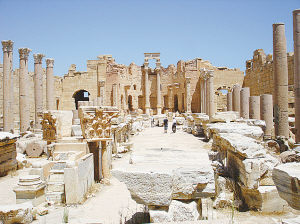It seemed that no matter what the circumstances,
似乎是無論什么情況
the laws somehow always went against the plebeians.
法律總是和平民對立
After decades of agitation,
在數十年的社會不適應之后
a code of laws was drafted and adopted.
起草并采用了一部分法律
Granted the resulting Code of 12 Tables was not a systematic set of laws.
但是十二銅表法不是系統的法律條文
It still favored the patricians.
依然偏向于貴族
For one thing, it specified for just about any offense,
首先,它指定說,同樣的過錯

a stricter penalty for a guilty plebeian
平民受到的懲罰更加嚴重
and a less strict penalty for a guilty patrician.
貴族受到的懲罰要輕一些
Yet, the Code of 12 Tables fundamentally stabilized Roman society by establishing what we call the rule of law.
但是,十二銅表法實現了法治最終穩定了羅馬社會
Over a period of time,
經過一段時間
through a process called the conflict of the orders,
通過秩序的沖突
the plebeian class built upon the rule of law to win further concessions,
平民階層建立了法治以獲得更進一步的讓步
such as the right to elect tribunes,
例如選舉護民官的權利
to marry into patrician families,
和貴族家庭通婚的權利
and even to hold the consulship.
甚至是擔任執政官的權利
The system of quote/unquote Latin rights
所謂的拉丁權力系統
made it possible for Italians blessed with such rights to transition smoothly into Roman citizenship.
允許意大利人享受這樣的權力順利地過渡成羅馬人
Adding not only numerical weight,
這不僅僅是數字上的變化
but needed fresh blood to the Roman citizen body.
而且需要為羅馬加入新鮮血液
Segment 7c: The Roman State Religion.
7c 羅馬的國教
Like most ancient societies, the Romans started out worshipping animistic deities.
和很多古代社會一樣羅馬一開始信奉萬物有靈論的神靈
That is gods and goddesses with
也就是沒有
no particular human personality
人類形態的神
and no particular human appearance.
沒有特定的人類外表
These animistic deities or numina were generally connected with agriculture and the home.
這些numina神靈通常和農業與家庭有關
For example, Sterculinus or Sterculius,
例如Sterculinus斯忒耳枯利烏斯
the name means poop god, was the god of manure.
也就是糞神他是糞肥之神
Bizarre as the concept of a poop god sounds
對我們這些21世紀的城市人來說
to us 21st century city slickers,
糞神這個概念聽上去很奇怪
the Romans may not have understood why poop made such an effective fertilizer.
羅馬人可能不理解為什么糞便能作為肥料
They knew only that it worked.
他們只知道糞便能當肥料用
And the Romans intended to keep the poop doing its job, of course, by offering thanks and praise to Sterculius, the poop god.
羅馬人要讓糞便發揮作用當然,方法是感謝并贊美糞神斯忒耳枯利烏斯
Even when Rome became more urbanized after it became the largest city in the world,
盡管羅馬在成為世界上最大的城市后城市化加深
this sort of animistic deity remained popular.
但是這種崇拜依然流行
The Cloaca Maxima,
馬克西姆下水道
built under the Etruscans to drain the swamps between the hills of Rome into the Tiber River
伊特魯利亞人建造的把七丘之間的污水排到臺伯河中
was overseen by a goddess known as Cloacina, or sewer goddess.
它是在女神克羅阿西娜的監督下完成的她是下水道女神
Since the sewer kept the Roman forum dry,
因為下水道讓古羅馬城市廣場保持干燥
obviously Cloacina had to be kept happy.
因此,一定要讓克羅阿西娜保持開心狀態
Later on, Cloacina was associated with the Roman goddess of beauty and love.
之后,克羅阿西娜和羅馬的美與愛神聯系起來
Venus was her name. You got it?
她的名字是維納斯,知道嗎?
Early in their history,
在羅馬人的歷史早期
the Romans acquired from the Etruscans a state religion based upon anthropomorphic ancient Greek deities.
羅馬人從伊特魯利亞人那里學到了一種國教其中有擬人的古希臘神靈
But the Romans never forgot or ignored
但是羅馬人從未忘記或者忽略
the humble religious practices of their illustrious ancestors.
他們輝煌的祖先舉行的謙卑的宗教活動
The household gods called the Lares and Penates were especially beloved,
家神被稱作拉瑞斯和珀那忒斯深受愛戴
as was the personal genius or guardian spirit.
因為他們守衛心靈
In imperial times, the emperor's genius would itself be worshipped as a god.
帝國時期,皇帝的天賦被當做神來崇拜
But that's several chapters later.
我們之后會講到
The mos maiorum especially applied to Roman religion.
祖先的道路適用于羅馬宗教。











